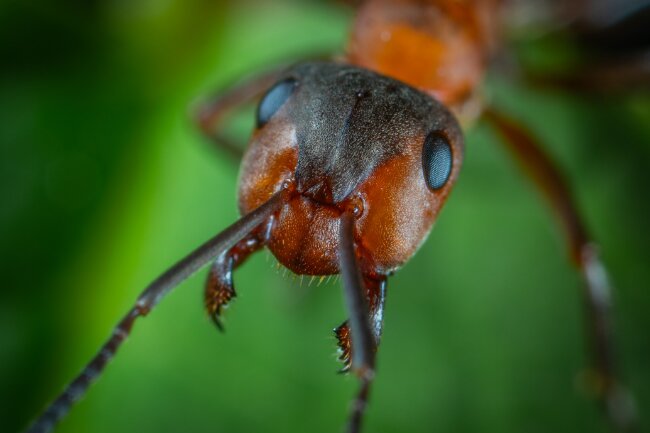There are a range of smells that ants avoid, such as citrus, lavender and mint. These plants have developed these chemicals in order to put off insects that might otherwise feed on them.
Contents
How do ants smell?

If you look closely at the face of an ant, you will quickly notice there is something missing. There are eyes and a mouth, but in between, there is no nose. So given that ants do not have the one body part we most associate with smell, how do they detect scent?
With ants, as with most insects, there is no need for a nose, as they have a very sophisticated pair of antennae. Antennae may not look like much, but they are amazing sensory organs, that can detect a wide range of chemicals and other sensory information, depending on the species.
On the surface of the antennae are a series of chemoreceptors that can detect when certain chemicals are present. These then activate electrical signals that head to the ant’s brain.
While this may seem very different from our way of smelling things, it is almost the same process in mammals and humans, just in a different format.
Also read: Do Ants Have Ears? How do They Hear?
What smells do ants hate?
Ants are fascinating and essential creatures for the healthy running of the planet. Depending on the species, they can help enrich the soil, control pests and provide food for many different kinds of wildlife.
| Smell | Effect on Ants |
|---|---|
| Peppermint | Repels ants and disrupts their scent trails |
| Lemon | The strong citrus scent deters ants |
| Cinnamon | Cinnamon acts as a natural ant repellent |
| Vinegar | The strong smell of vinegar repels ants |
| Eucalyptus | Eucalyptus oil or leaves can deter ants |
However, it’s also true that there are places we would prefer ants didn’t go, such as in our houses. Chemical methods of control aren’t very good for the planet, and certainly aren’t very nice for ants.
However, the good news is that many plant species have spent millions of years perfecting chemical warfare to ward off harmful or annoying insects. Indeed, most of our favourite flavours only exist because a plant got tired of being nibbled on.
| Smell | Application Methods |
|---|---|
| Peppermint | Place peppermint oil-soaked cotton balls near ant entry points |
| Lemon | Use lemon essential oil or fresh lemon peels in affected areas |
| Cinnamon | Sprinkle cinnamon powder or use cinnamon essential oil |
| Vinegar | Create a vinegar solution and spray it along ant trails and entry points |
| Eucalyptus | Apply eucalyptus oil on cotton balls near ant-infested areas |
Therefore, these natural insect repellents can be repurposed to suit our needs, to keep ants away from our homes, and avoid needlessly killing these fascinating insects. Here are a few firm favourites
Peppermint

Mint is a wonderful, refreshing fragrance that we have put into everything from toothpaste to boiled sweets. Yet, originally mint created its potent chemical formula to protect itself from being eaten, making our obsession in including it in our cooking a little ironic. Still, the mint plants have won in the long run, being cultivated and planted far more wildly because of their lovely fragrance and taste.
Lavender

Another favourite of the flowerbed, lavender has few natural enemies in the insect world. It’s so good at scaring the leaf nibblers away that it is often planted as a companion plant to help protect neighbouring vegetables from hungry intruders.
Citrus

The wonderful tangy sharpness of citrus fruit was originally to discourage pesky bugs until the fruit could be ripe enough to be picked and eaten by larger animals, who would distribute its seeds much more widely.
Why not have the best of both worlds, by eating the tasty fruit and saving the peel to ward away the coming ant army.
Coffee grounds

Coffee grounds may appear like waste to us, but actually, they have a number of handy uses. For example, you can use them to fertilise your garden, freshen up your refrigerators, or of course scare away ants.
Also read: Wondering “What do Ants Eat?” – FAQ
Do ants hate salt?
Ants, like all living creatures, need a certain amount of salt to survive. However, salt can also pull the moisture out of living beings. It’s for this reason it has often been used as a preservative in the past. Therefore, ants will avoid large amounts of salt as it risks drying them out.
Do ants hate vinegar?
Vinegar has been used for thousands of years as a cleaning agent, due to its slight acidity. Today, many environmental writers still recommend it as the best way to make your sinks shine without using harsh chemicals.
Added to this is the benefit that vinegar is a natural insect deterrent, either due to its strong smell or the acidic nature of the liquid. For ants, vinegar can cause particular problems as it can break the scent trail they need to follow to know where they are going. Once a scent trial is destroyed, ants will often wander back to the nest.
Do ants smell?

As well as the question of whether ants dislike certain smells, it’s worth considering whether ants themselves have a smell. In fact, ants can distinguish their nest mates from intruders from their scent.
When ants greet one another, you will often see them touching each other with their antenna. This helps them to recognise the other ant by its smell. It’s thought that each nest has an individual scent based on the various chemical components of the soil, the excretions of the ants, and other important odours.
As well as allowing for a more intimate greeting, this scent will decide whether the ant will aid its companion. For example, if an ant is injured during a fight, its friends will carry it home and care for it if it is one of theirs. If it is from a neighbouring colony, then they will leave it where it is.
If out on a raiding party, they are also likely to attack those ants they recognise as not their own. Interestingly, army ants may also be able to recognise their long-lost family by smell, as they will seek out and rejoin a colony grounded by one of their related queens if their own queen should die.
Some butterfly species have managed to replicate the smells and sounds of ant larvae or queens, however, and can sneak into a nest and live a life of luxury by convincing the ants they are one of them, despite appearing very different visually.
Also read: Do Ants have Lungs? Do They Need Oxygen to Breathe?
A fragrant house
The great thing about using scent to deter ants is that we also get the benefit of these wonderful fragrances ourselves. Certain smells can help relax or invigorate, and make a space more pleasant to be in. A much better alternative to harmful poisons, that have no additional benefits to the human occupants of the home.

